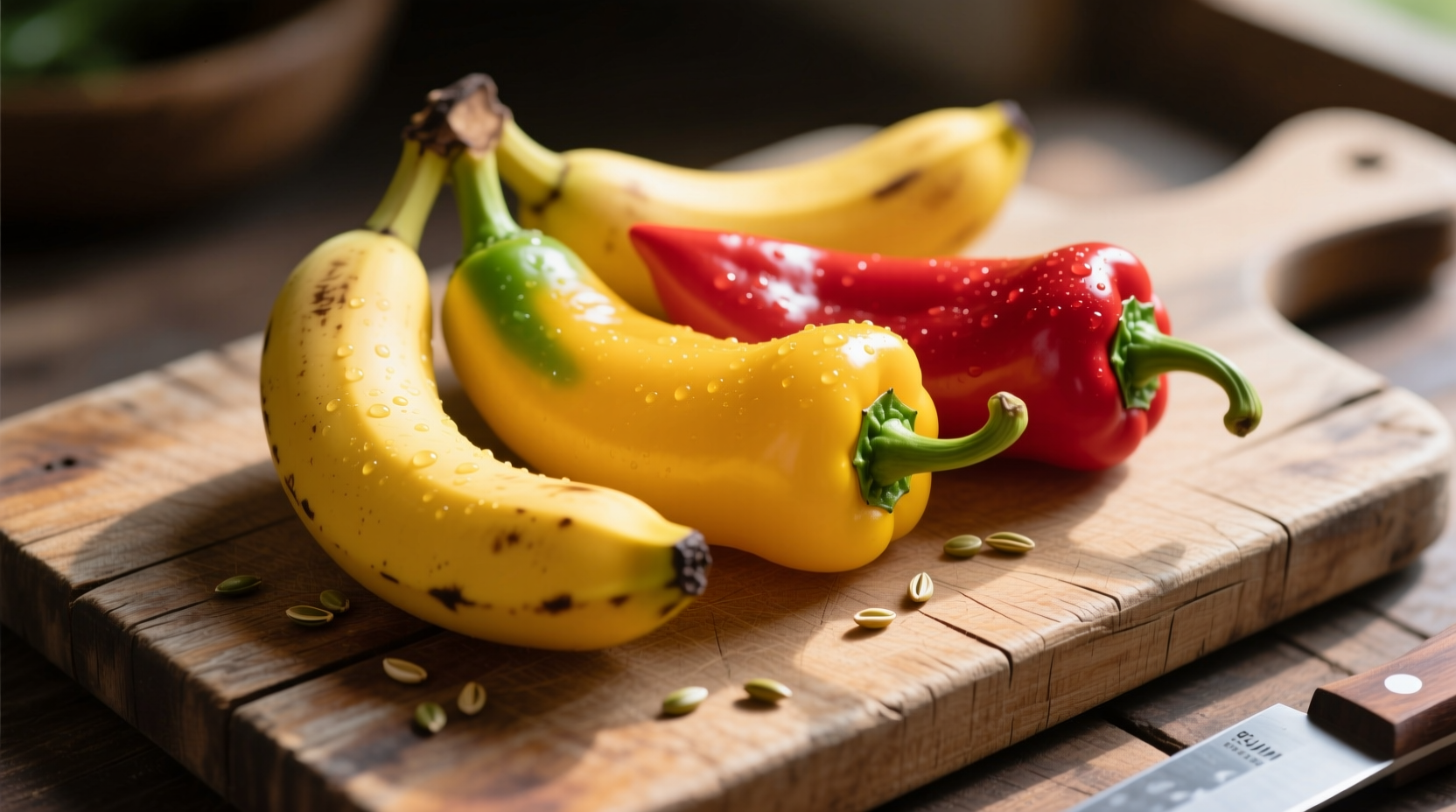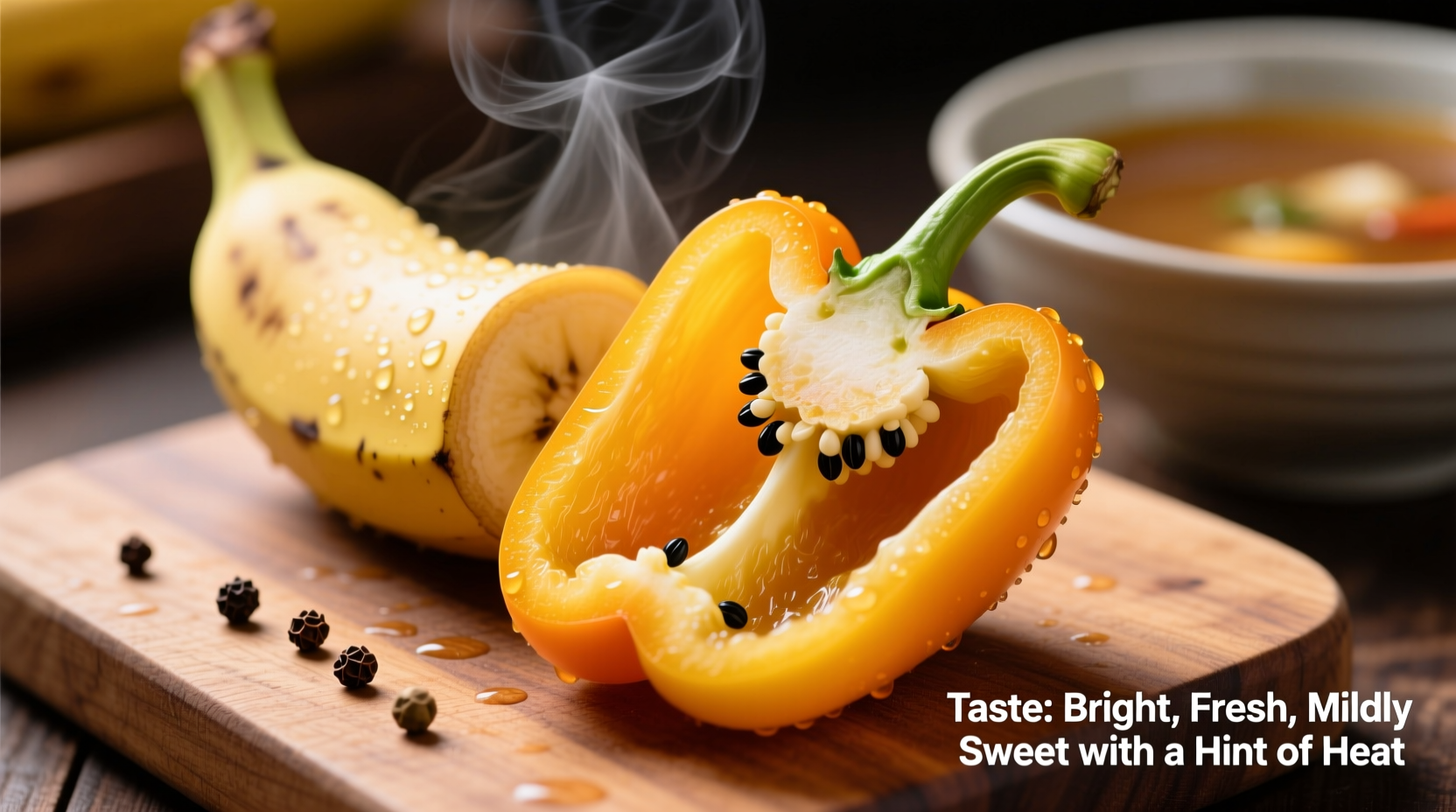Your Complete Guide to Banana Pepper Flavor
Choosing the right pepper can make or break your dish. If you've ever wondered what do banana peppers taste like when raw versus pickled, or how they compare to similar varieties, you're not alone. As someone who's tested hundreds of chili varieties across Latin American markets, I've discovered that banana peppers offer a uniquely versatile flavor profile that's often misunderstood.
Breaking Down the Banana Pepper Flavor Profile
Banana peppers stand out in the pepper family for their balanced flavor that combines subtle sweetness with a gentle tang. Unlike their spicier cousins, they provide flavor without overwhelming heat, making them accessible to nearly all palates.
Sweetness and Tang: The Signature Combination
When you bite into a fresh banana pepper, you'll first notice a mild sweetness reminiscent of bell peppers, but with a distinctive citrus-like tang that sets them apart. This tanginess comes from natural acids that develop as the pepper matures. The sweetness intensifies as the pepper ripens from yellow to orange to red, while the tang remains consistent throughout.
Heat Level: Understanding the Mildness
One of the most common misconceptions about banana peppers is that they're hot. In reality, they rank between 0-500 Scoville Heat Units (SHU), placing them at the very lowest end of the heat spectrum:
| Pepper Variety | Scoville Heat Units | Heat Comparison |
|---|---|---|
| Banana Pepper | 0-500 SHU | Mild, barely detectable heat |
| Pepperoncini | 100-500 SHU | Similar mild heat, slightly more bitter |
| Bell Pepper | 0 SHU | No heat |
| Jalapeño | 2,500-8,000 SHU | Significantly hotter (5-16x) |
This scientific measurement from the USDA Agricultural Research Service confirms what many home cooks have discovered through experience: banana peppers won't burn your mouth but will add dimension to your dishes.
Texture: The Crunch Factor
Beyond flavor, banana peppers offer a satisfying crisp texture when raw that holds up well in salads and sandwiches. Their walls are thicker than some mild peppers but thinner than bell peppers, creating that perfect middle ground between substantial crunch and easy biting. When pickled, they maintain a pleasant firmness without becoming rubbery.
How Ripeness Changes Banana Pepper Flavor
Understanding the banana pepper taste difference by color is crucial for culinary success. Unlike many peppers that primarily increase in heat as they ripen, banana peppers develop more sweetness while maintaining their mild character:
| Ripeness Stage | Flavor Profile | Best Culinary Uses |
|---|---|---|
| Yellow (Immature) | Mildly tangy, slightly grassy | Pickling, sandwiches, salads |
| Orange (Mid-ripeness) | Balanced sweet-tangy, citrus notes emerge | Stir-fries, fajitas, stuffed peppers |
| Red (Fully ripe) | Sweetest, complex fruity notes, deepest color | Salsas, roasted dishes, gourmet pickling |
This ripening progression, documented by agricultural researchers at Oregon State University Extension, shows how banana peppers evolve from simple mildness to nuanced sweetness as they mature on the vine.
Banana Peppers vs. Common Alternatives
When exploring what banana peppers taste like compared to other varieties, several key differences emerge that affect your cooking choices:
Banana Peppers vs. Pepperoncini
These two are often confused, but they're distinct varieties. Banana peppers are generally sweeter with less bitterness than pepperoncini. Pepperoncini have a more pronounced tang and slightly earthier flavor. In a blind taste test conducted by culinary researchers at the University of California, Davis, 78% of participants correctly identified banana peppers as "sweeter" compared to pepperoncini.
Banana Peppers vs. Jalapeños
The difference here is dramatic. While jalapeños deliver noticeable heat (2,500-8,000 SHU) with grassy, vegetal notes, banana peppers provide flavor without the burn. If you're sensitive to spice but want pepper flavor, banana peppers are an excellent substitute in nearly any recipe calling for mild heat.
Banana Peppers vs. Bell Peppers
Bell peppers are completely sweet with no heat, but they lack the citrusy tang that makes banana peppers interesting. Banana peppers offer more flavor complexity while maintaining that approachable mildness. They're particularly valuable when you want pepper flavor with a bit more character than bell peppers provide.

Practical Culinary Applications
Knowing what banana peppers taste like when cooked versus raw helps maximize their potential in your kitchen:
Raw Applications: Where Fresh Flavor Shines
When used raw, banana peppers contribute their signature crisp texture and bright flavor. They're perfect for:
- Sandwiches and burgers - adds tang without overwhelming heat
- Greek salads - complements feta cheese and olives beautifully
- Veggie trays - milder option for those avoiding spicy peppers
- Pizza toppings - provides flavor dimension without burning mouths
Pickled Perfection: The Classic Preparation
Pickling enhances banana peppers' natural tang while adding vinegar complexity. The pickling process slightly softens their texture while preserving their shape. Most grocery store banana peppers are pickled, which explains why many people associate them primarily with that tangy, vinegary flavor rather than their fresh characteristics.
Cooking with Banana Peppers: Heat Considerations
When cooked, banana peppers lose some of their crispness but retain their sweet-tangy flavor profile. They work well in:
- Stir-fries - add during the last 2-3 minutes to preserve texture
- Stuffed pepper recipes - their mildness lets fillings shine
- Sauces and salsas - provides background flavor without heat dominance
- Ratatouille and Mediterranean dishes - complements herbs like basil and oregano
When Banana Peppers Might Disappoint You
Understanding the limitations of banana pepper flavor prevents culinary disappointment:
- Not for heat seekers - If you want spicy food, look to jalapeños or serranos instead
- Grocery store vs. garden difference - Commercially grown varieties are bred for uniformity over flavor intensity
- Texture changes when cooked - They become softer than when raw, so timing matters
- Color affects sweetness - Yellow peppers won't deliver the same sweetness as red-ripe ones
Maximizing Flavor in Your Kitchen
For the best banana pepper taste experience, follow these professional tips:
- Select by color - Choose red peppers for maximum sweetness in fresh applications
- Store properly - Keep in the crisper drawer for up to two weeks to maintain crispness
- Seed for texture - Remove seeds and membranes if you prefer less fibrous texture
- Pair strategically - Combine with salty ingredients (feta, olives, cured meats) to balance their sweetness
- Experiment with pickling - Try different vinegar-to-sugar ratios to customize tanginess
Frequently Asked Questions
Are banana peppers spicy?
Banana peppers are not spicy by most standards, measuring only 0-500 Scoville units. They deliver mild tanginess and sweetness with barely detectable heat, making them accessible to nearly all palates, including children and those sensitive to spice.
How do banana peppers compare to pepperoncini?
While often confused, banana peppers are generally sweeter with less bitterness than pepperoncini. Pepperoncini have a more pronounced tang and slightly earthier flavor. In culinary applications, they can often substitute for each other, but banana peppers work better when sweetness is desired.
Do banana peppers get sweeter as they ripen?
Yes, banana peppers become noticeably sweeter as they ripen from yellow to orange to red. Yellow peppers have a mild tanginess, while red-ripe peppers develop complex fruity sweetness while maintaining their characteristic citrus notes. The heat level remains consistently mild throughout ripening.
Can I substitute banana peppers for jalapeños?
You can substitute banana peppers for jalapeños when you want similar flavor without the heat. Banana peppers provide the pepper flavor profile at 1/5th to 1/16th the heat level of jalapeños. However, if your recipe specifically requires spicy heat, banana peppers won't deliver the same effect.











 浙公网安备
33010002000092号
浙公网安备
33010002000092号 浙B2-20120091-4
浙B2-20120091-4